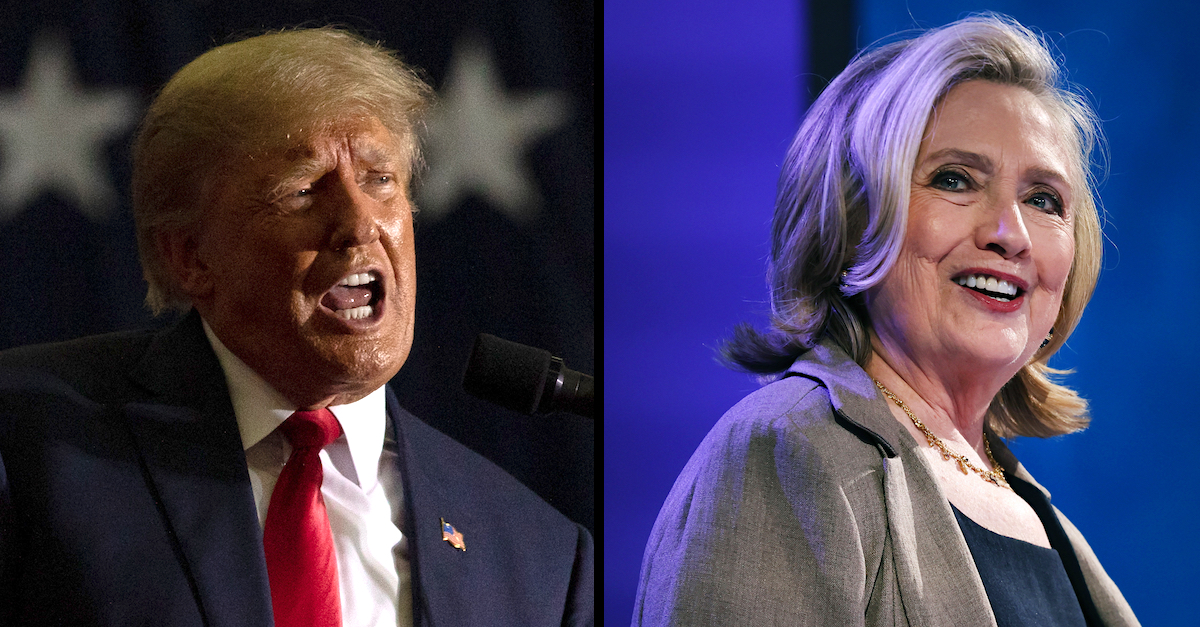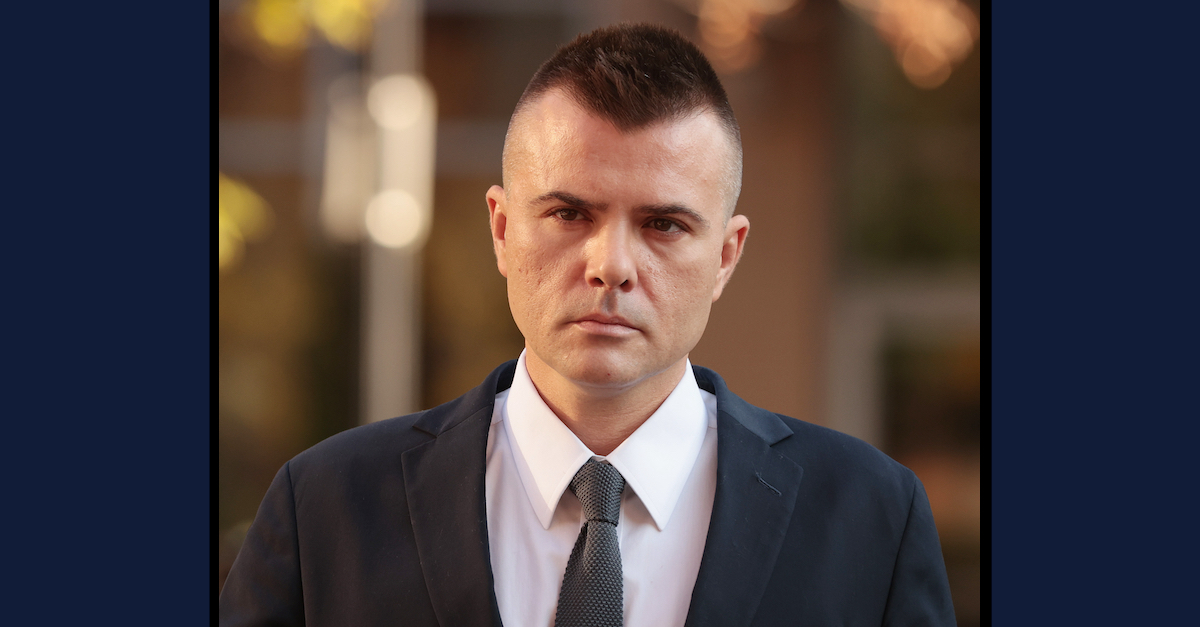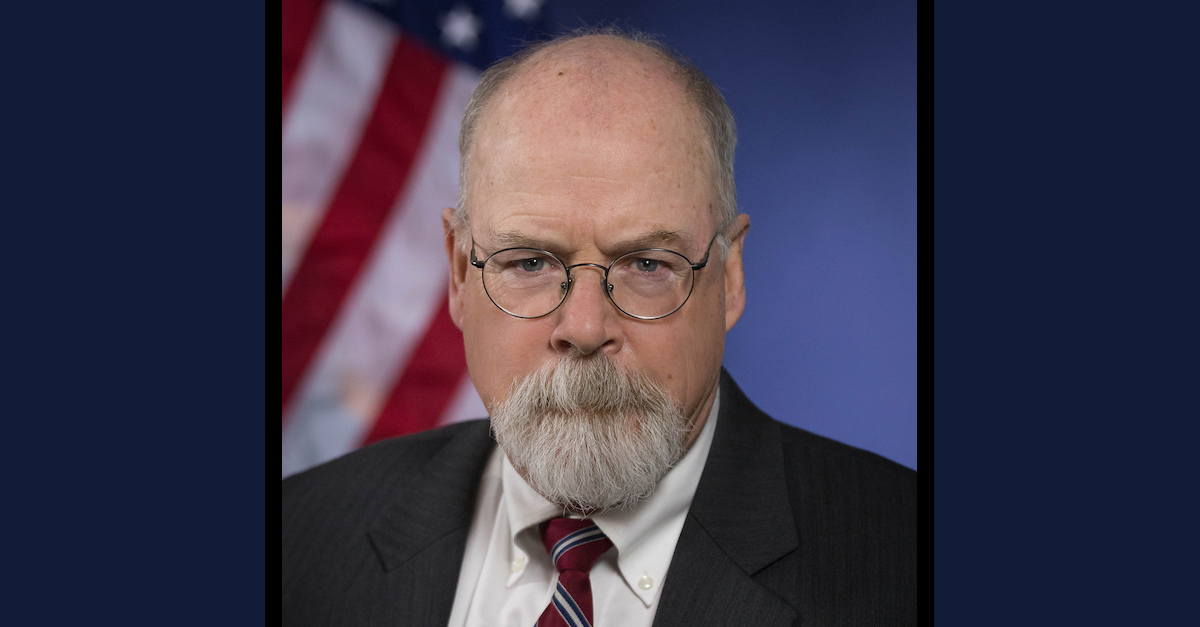
Donald Trump was photographed speaking at a rally on Oct. 1, 2022, in Michigan. Hillary Clinton was seen Sept. 19, 2022, at an event in New York City.
Attorneys for Donald Trump this week responded to a request for sanctions filed by one of the many defendants named in a sprawling yet scuttled racketeering lawsuit against Hillary Clinton and others. A federal judge dismissed the case, but the issue of sanctions — a punishment for filing the suit — remains on the table at the district court level as Trump’s attorneys contemplate an appeal.
Trump claimed Charles Halliday Dolan Jr. was among those who played roles in a conspiracy against his 2016 election campaign by engaging in a plot that broadly alleged Trump had colluded with Russia. Among the many named defendants were the Democratic National Committee, the law firm Perkins Coie, that firm’s former partner Michael Sussmann, Rep. Debbie Wasserman Schultz (D-Fla. 23), Fusion GPS, Christopher Steele, former FBI Director James Comey, former FBI agent Peter Strzok, former FBI attorneys Lisa Page and Kevin Clinesmith, and former deputy FBI director Andrew McCabe.
Dolan moved for sanctions on Sept. 21 and stressed that several of the purported “facts” Trump alleged against him were flatly false. Among the alleged errors were Trump’s claims that Dolan had once been the chair of the Democratic National Committee and that Dolan was a resident of New York. Dolan quipped that his “resume is available online and could have been easily checked” for accuracy. He also asserted that Trump’s lawsuit was little more than “speculation, rumor and innuendo.”
Trump’s attorneys eventually walked the DNC reference back; they later attested that Dolan was the former chairperson of a “national democratic political organization.”
“That does not fix the problem,” Dolan’s lawyers stressed, “as Mr. Dolan was never the Chairman of any such organization.”
Trump’s attorneys countered this week that Dolan’s request for sanctions was made “[w]ithout any basis in fact or law.” Their response pointed to the work of special counsel John Durham, who was appointed by Trump-era Attorney General Bill Barr to investigate whether any “person or entity violated the law in connection with the intelligence, counter-intelligence, or law-enforcement activities directed at the 2016 presidential campaigns.”
Trump’s filing avers, in part, that Durham’s indictment of Igor Danchenko was satisfactory source material for the civil RICO lawsuit against Dolan:
Defendant’s stance is disingenuous and without merit. Most importantly, it is provably false. Indeed, the Amended Complaint was methodically compiled in reliance on official government documents and other authoritative sources. As demonstrated below, the vast majority of Plaintiff’s allegations against Defendant were sourced directly from Special Counsel John Durham and, more specifically, his criminal indictment against Igor Danchenko. The indictment — which is the culmination of a large-scale, years-long investigation by a highly-qualified federal agency — is rife with actionable allegations against Defendant and provides ample support for the claims asserted Defendant in this civil action. In addition, Plaintiff’s counsel has undertaken significant, diligent, and good-faith steps to assure that the Amended Complaint has a legitimate evidentiary and stands by the adequacy of those efforts.
The filing continues:
In short, Defendant’s motion is entirely without merit; it lacks specificity, is devoid of factual and evidentiary support, and is comprised of nothing more than thread-bare legal analysis. Plaintiff’s claims are rooted in evidentiary support, based on viable legal theories, and present actionable claims against Defendant for his role in furthering the false narrative that Plaintiff colluded with the Russian government to undermine the 2016 Presidential Election.
In other words, Trump’s attorneys in the RICO case are standing on the foundation of Durham’s work.

Russian analyst Igor Danchenko arrives at the Albert V. Bryan U.S. Courthouse before being arraigned on November 10, 2021 in Alexandria, Virginia. Danchenko was charged with five counts of making false statements to the FBI regarding the sources of the information he gave the British firm that created the so-called “Steele Dossier,” which alleged potential ties between the 2016 Trump campaign and Russia.
Durham has asserted that Danchenko was an FBI operative — a “confidential human source of the FBI” who then ironically “lied to FBI agents” during several interviews.
Durham secured a five-count grand jury indictment which alleges that Danchenko lied to the FBI. The Nov. 4, 2021 indictment is just days away from trial as of the date of this report: the case is scheduled to be tried on Oct. 11, 2022 and is expected to wrap up around Oct. 21, 2022.
According to Trump’s attorneys, the claim that Dolan was the chairperson of a “national democratic political organization” was premised on Durham’s work.
The verbatim of Trump’s response reads as follows:
First, Defendant incredulously claims that there is “no factual basis” to support Plaintiff’s assertion that he had “previously served as the chairman of a national democratic political organization.” Am. Compl. ¶ 96. Despite Defendant’s belief, this statement was not merely surmised as “unfounded speculation” on the part of Plaintiff’s attorneys. (DE 268 at 6). Instead, it was directly sourced — and cited word-for-word — from an official government pleading drafted by Special Counsel John Durham, who had been appointed by then-Attorney General, William Barr, to commence an investigation into “whether any federal officer, employee, or [] other person or entity violated the law in connection with the intelligence, counter-intelligence, or law-enforcement activates directed at the 2016 presidential campaigns, individuals associated with those campaigns, and individuals associated with the administration of President Donald J. Trump.” Namely, Plaintiff relied upon the indictment of Igor Danchenko filed on November 3, 2021 in the criminal matter of United States v. Danchenko (the “Indictment”). See Declaration of Alina Habba, Esq., Exhibit A; see also United States v. Danchenko, case no. 1:21-cr-00245-AJT, Eastern District of Virginia (ECF No. 1). The Indictment, which was filed more than one year into a large-scale government investigation and pursuant to grand jury proceedings, stated precisely that Defendant “had served as [] chairman of a national Democratic political organization.” Id. at ¶ 19 (emphasis added). The Indictment goes on to describe Defendant’s “intimate ties” to the Clintons and the Democratic parties, stating that he also served as “state chairman of former President Clinton’s 1992 and 1996 presidential campaigns, and [] an advisor to Hillary Clinton’s 2008 Presidential campaign” and elaborating that “President Clinton appointed [Defendant] to two four-year terms on an advisory commission at the U.S. State Department” and that Defendant “actively campaigned and participated in calls and events as a volunteer on behalf of Hillary Clinton.”
The Trump document goes on to assert that “nearly all of the allegations pertaining to Defendant were sourced directly from the [Danchenko] Indictment” and, accordingly, that the “evidentiary basis for the allegations” in Trump’s RICO civil lawsuit “were made in reliance upon, and in deference to, official government pleadings” filed by Durham.

John Durham.
Specifically, in an attempt to foil Dolan’s quips, Trump’s lawyers asserted that Durham’s filings on Dolan’s background were “a more credible source” than Dolan’s online “resume.”
As if to prop up the work of Durham, Trump’s lawyers also called the Office of Special Counsel a “highly-qualified federal agency that wields immense investigatory authority has access to state-of-the-art resources in carrying out its investigations.” Accordingly, Trump’s lawyers asserted that Durham was “undoubtedly in a better position than Plaintiff’s counsel to substantiate the veracity” of Dolan’s background than Trump’s attorneys were. Thus, according to Trump’s lawyers, it was legally acceptable for them to mimeograph Durham’s claims without any additional exploration or examination.
Durham has spent nearly four and a half million dollars (as of his last report) prosecuting Danchenko (who has yet to go to trial), Sussmann (who was acquitted), and Clinesmith (who pleaded guilty to altering an email and avoided jail time).
Dolan’s motion for sanctions said Trump’s lawyers also erroneously connected him to rumors of “salacious sexual activity” in the Steele Dossier.
Trump’s lawyers responded by noting that the Danchenko indictment lists Dolan was a “source of information” for the Steele Dossier. They said Dolan has proffered nothing other than a “self-interest statement” in response to the indictment — one that “does nothing to dimmish [sic] the likelihood that Defendant himself was the one who concocted the ‘salacious sexual activity’ rumor, particularly in light of the fact that he has admitted to providing other ‘fabricated’ information to Danchenko.”
And, as to Dolan’s correct state of residence, the following excuse was proffered by Trump’s attorneys:
Defendant’s only remaining gripe is that the Amended Complaint purportedly misstates his state of residence, claiming that he is a resident of Virginia, not New York. Nonetheless, Plaintiff’s counsel did indeed exercise diligence prior to making this assertion. Initially, it must be noted that Charles Dolan is an incredibly common name, and Plaintiff counsel’s traditional search methods identified countless individuals with said name across the country, many of whom reside in New York. To narrow the field, Plaintiff’s counsel looked towards other sources and ultimately relied upon several news articles which claimed that Defendant currently works for Ketchum, Inc., a public relations firm headquartered in New York. Thus, Plaintiff’s counsel made a reasonable inquiry into the state of Defendant’s residence and had a good faith basis for believing that Defendant was a resident of New York.
[ . . . ]
Defendant has failed to show how he was prejudiced by this purported error, nor how this statement alone could serve as a basis to issue sanctions against Plaintiff.
The overall thrust of Trump’s sanctions motion is that Dolan, in the view of Trump’s attorneys, “does not come close” to meeting the “heavy burden of demonstrating that sanctions are warranted.”
“Here, woven into the large-scale conspiracy alleged between many of the Defendants, Plaintiff [Trump] adequately pleaded the existence of a civil conspiracy between Defendant and, at a minimum, Danchenko, Clinton, and the Clinton Campaign,” Trump’s lawyers asserted — despite the fact that their case had been dismissed but for the issue of sanctions.
The full Trump reply is below:
(Photos as follows: Trump by Emily Elconin/Getty Images; Danchenko via Chip Somodevilla/Getty Images; Durham via a government portrait; Clinton by Spencer Platt/Getty Images.)
Have a tip we should know? [email protected]